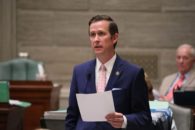Although Missouri’s colleges “experienced positive opportunities” when adapting to the COVID-19 pandemic, the need for a statewide remedy to increase access to reliable internet was evident across the board, according to a recent report from the Department of Higher Education & Workforce Development.
The department’s report provided information from surveying more than 75 public and private universities and colleges from March through May on their experiences moving to online learning. Universities reported challenges including technical capacity, a lack of hands-on learning, student experiences, and communication issues.
“While many of Missouri’s colleges and universities entered this moment with great uncertainty, we are pleased that campuses were able to identify and address issues and challenges facing students,” Commissioner of Higher Education Zora Mulligan said in a statement. “We hope administrators and educators will reference this report as they determine how to best serve students going forward.”
One of the biggest concerns cited by universities was access to online learning itself. Seventy-five percent of institutions said less than a quarter of their staff were trained to teach online classes, with 65 percent reporting that a quarter of their students did not have the necessary software to learn remotely, and 64 percent reporting a lack of equipment for online learning for a quarter of students.
The report stated that several institutions ran into issues with students and faculty in rural areas struggling to connect to online resources due to the lack of broadband internet services in those areas. Many classes were forced to switch to lectures via web services like Zoom, and homework moved online as well. Every institution reported that the lack of reliable internet access in all areas of the state was a major obstacle to the transition to online learning with many pressing statewide internet access as a necessity for online learning in the future, according to the report.
Some colleges reported providing free internet access to students. Institutions met students’ needs for access by distributing computers with built-in connections, computer loaning programs, awarding scholarships for the purchase of hardware, providing Wi-Fi in school parking lots to allow students to access the internet from their cars, and more.
Despite its challenges, many universities said employees and students enjoyed the flexibility of online education and found ways to continue learning, according to the report. Institutions expanded online support systems, like tutoring and IT services, and increased student engagement through phone calls and virtual check-ins.
The report otherwise addressed concerns raised by institutions as well as possible solutions for the future. Campuses are creating strategies for remote learning by adapting campus infrastructure, encouraging communication between staff and students, adapting school policies to improve flexibility, and increasing students’ access to resources with help from community sponsors, the report said.
You can read the full report here.
EDITOR’S NOTE: For up-to-date information on coronavirus, check with the CDC and DHSS.

Cameron Gerber studied journalism at Lincoln University. Prior to Lincoln, he earned an associate’s degree from State Fair Community College. Cameron is a native of Eldon, Missouri.
Contact Cameron at cameron@themissouritimes.com.
















